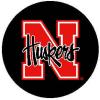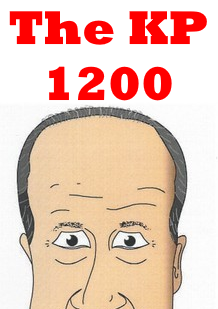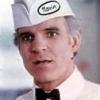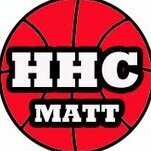Then & Now: Kelly Lively
Compiled By Dave Brandon
(Photo Courtesy NU Media Relations)
 Kelly
Kelly
Lively played at Nebraska from 1989-1991, and was a key
member of the 1990-1991 team that won a school record 26
games.
The 7’0” 215 pound Lively served as
Rich King’s backup while at Nebraska, and was recently
back in Lincoln last weekend as part of the 1990-1991
Team Reunion, including the
HHC exclusive meet and greet at P.O. Pears.
Lively is our latest guest in this Sunday’s edition of
“Then & Now”.
HHC: Thanks for
joining us. Did you have fun last weekend?
KL: Oh yeah. I loved being down on the
floor at the Devaney Center and seeing a real big
turnout. Just seeing all the fans in full gear was great
again. The fact that we lost was the absolute low point
of last weekend, but the high point was being down there
at halftime.
HHC: Agreed on that
game, it was depressing. Anyway, you played high school
basketball at Torrington High School, where you were
named the Wyoming Gatorade Player of the Year in your
senior season (1987) after averaging 16.0 PPG, 10.6 RPG,
and leading your team to a 23-0 record and state
championship. What was it like being a part of that, and
did it help prepare you well for the Big 8?
KL: High school was a
good time, but did it prepare me for the Big 8 at all?
Absolutely not.
That year in 1987, the Big 8 was at
its all-time high. I think Kansas and Oklahoma played
for the final, and competition in Wyoming was nowhere
near the caliber that I was about to see that next year
at Nebraska.
I think that in 1988, I ended up
touring around on a Big 8 team, going to places like
Czechoslovakia with future NBA players like Doug Smith,
and representatives from Kansas and Oklahoma.
HHC: What made you choose to come play
basketball at Nebraska, and who else recruited you hard?
KL: I was actually recruited by Creighton.
They were one of the five trips that I took. I looked at
schools in Colorado and Oklahoma as well. Not Oklahoma
or Oklahoma State, but Tulsa, who was one of the first
schools interested in me.
What made me come to Nebraska? I
think it was close enough to home for friends and family
to be able to see me play, but not too close where your
parents are there every weekend type of thing. Also, in
order to play beyond college, I was going to have to put
on a lot of strength and weight, and I thought if anyone
could do that, it’d be Nebraska.
Plus, the strength and reputation
of the Big 8 was a big draw as well, as was the quality
of academic program. It was all a great package.
HHC: What was the perception of Nebraska
basketball to an out of state high school kid back then,
and what did you know about the Huskers?
KL: (Laughs) I knew very little about
Nebraska basketball. But Torrington is right on the
border of Wyoming and Nebraska, so there’s such an
influence where you either love them or hated them. It
was kind of like back in the days you were either rock
and roll or country, there was no in-between, it was
kind of the same thing.
I knew that the state of Nebraska
supported the university tremendously. I had
opportunities to go to the coast in big cities and cause
lots of trouble. (Laughs) But I got in the least amount
of trouble during my visit to Nebraska as anywhere, so I
thought it was the one. I hung out with Beau (Reid) and
Bill (Jackman), and thought, “this is where I need to
be, because going to school in Los Angeles would get you
in all kinds of trouble.”
HHC: Talk about your relationship with
Danny Nee, both at the start of your career and at the
end?
KL: Well, let’s say
that Danny and I are probably complete opposites. You
take somebody who grew up in Brooklyn, and someone who
grew up in Cowboy country. And I’m much more laid back
and easy going, relaxed, and Danny was just the
opposite.
On a person-to-person basis, we
didn’t have a lot in common or get along extremely well.
But I have uttermost respect for the guy, and thought he
did a great job administering and running a great
program.
And I’d do it again - I was
thinking about that last weekend. It didn’t turn out
nearly what I thought it was going to be in a lot of
different ways, but I think I’d do it again. It was a
good experience, real good education, and a great group
of guys.
HHC: You sat out in 1987-1988 to gain
strength and endurance, and as you mentioned earlier,
traveled with the Big 8 All-Star team to England and
Czechoslovakia in the spring of 1988. What was that
experience like?
KL: Sitting out was good exposure and
allowed me to mature and ease into things. And then,
having the opportunity to go on that trip and play on
that team was a once in a lifetime opportunity,
especially for a freshman when you’re playing with guys
with a lot more experience who have had good success as
starters for teams that were playing in the national
championship. You’ve got guys on your team wearing the
championship ring on their finger, and it’s a real good
experience to learn from them and spend a couple of
weeks practicing and traveling around.
European ball was much more
aggressive back then, as far as compared to collegiate
ball in the United States. Inside play was more
aggressive, and I think all of that was a good
preparation for what kind of ball we’d be playing in the
Big 8.
HHC: 1988-1989 saw your team go 17-16 and
into the 2nd round of the NIT. What sticks
out about that season?
KL: To be honest, I’m drawing a blank
there. I don’t remember the NIT much, but I do remember
playing at home in front of big crowds and getting a lot
of home support from the crowd.
HHC: 1989-1990 was a season of injury and
disappointment, as your team finished 10-18 and 7th
in the Big 8. How tough was that season to swallow?
KL: I think it was a
real gut check type of year. It was a year that pushed
enough people to the edge to think, “What are we going
to do?” Most of those people were sophomores at the
time, and their careers were half over, and it was
really a gut check type of thing. We all made the
commitment that we were sticking together and were going
to make it work by working harder in the off-season to
turn that program around.
HHC: Prior to
1990-1991, did you honestly have any idea that the team
would become near as good as it did?
KL: I think that’s probably the sweetest
aspect of the whole thing. From spending time last
weekend reminiscing, I forgot the fact that some of the
coaches and press had picked us 8th in the
Big 8, and we end up 9th in the country.
We talked about stories like
winning at Oklahoma that year. We weren’t supposed to do
that, let alone by 28 or 30 points, and that was
probably one of the highlights of the year. Just walking
out of Norman saying, “We weren’t supposed to do this.”
We were absolutely playing the best
we could at that time.
HHC: The 1990-1991 team went 26-8 and
finished in the Top 10 of some polls. What made that
team so successful?
KL: We spent a lot of time talking about
this very question last weekend. And it’s really tough
to point out any one particular thing. I think it takes
a team awhile to gel, and people to find their roles.
And I think we played our best when individuals weren’t
concerned about stats and individual play. And I think
we started playing more as a team, and I think over two
years, we kind of settled into our roles, and got more
comfortable with them.
Whether it was off the bench or
starting, or being a shooter or rebounder, we kind of
let some of that individualism go.
I will say that I think the big
games where we had the big TV coverage, why did we lose?
Well, I think people had the tendency to look at those
individual stats again, and I think that hurt us. That’s
just my guess, and nobody can put a finger on it, but
it’s probably more that we played at our best level when
everybody was playing as a team.
HHC: How tough was it
losing in that first round game to Xavier, especially
after you were a three seed?
KL: Aw man. (Pauses)
I’ve spent the last fifteen years not talking about that
(Laughs). You can just tell the emotion in peoples face
when that topic comes up. Usually, when I’m in a
conversation with somebody, like on an airplane, and
that question comes up, that’s usually a time I get up
and walk away (Laughs).
Obviously, some people took it (the
loss) harder than others, but it was something that was
a hard way to end the season.
HHC: Do you think it
was just Xavier playing over their heads that night?
KL: I think it was
all the hype of the NCAA tournament, and the TV
coverage, and the Metrodome. We were on the court with
Duke, who eventually won it, and rubbing elbows with
Shaquille O’Neill during warm-ups. And I think people
got immersed in it all and kind of lost the team focus.
HHC: Time for happy thoughts. What are
your favorite memories of Lincoln, both on and off the
court?
KL: I had a chance this past weekend to
remember a lot of good memories. On the court, there are
a lot of last second shots and real gut check efforts to
make things happen that other people have talked about.
Off the court, making a lot of good
friends. I’ve moved around a little bit since Lincoln,
and the quality of people you meet in Lincoln are great.
They are real friendly and down to earth people, and we
had a good time there.
HHC: And before we
get to today, can you tell us a classic and colorful
Danny Nee story or two so we can add it to our ongoing
collection?
KL: (Laughs) I’ve read through some of
those Danny Nee stories on your site, and like I said, I
have the utmost respect for him, so I don’t really have
anything incredibly funny to explain.
I was going to find out if he was
left handed or right handed, because that’s one thing I
do remember. He used to write with one hand, but when he
shifted the marker to the other hand, you better learn
to how duck (Laughs).
HHC: (Laughs)
KL: He was a great
coach, and we had a lot of good success. We were
opposites, but the results at the end of the year spoke
for themselves.
HHC: After 1990-1991, you still had one
remaining year of eligibility, and transferred to the
University of Denver. Talk about that.
KL: Well, I had that
year left, and was one credit shy of graduation from
Nebraska, and went to the University of Denver. It was a
town I’d always wanted to live in, and it had a very
reputable MBA program, which I finished in a year. And,
I got a chance to play again for the Denver Pioneers. We
had another 26-win season there, just like in 1990-1991,
and we were one game away from the Final 4 in Division 2
basketball.
And this last weekend, I made a
comment to the guys after I found out that I’m still
holding records for shot blocks and stuff at DU. And I
was recognized as the MVP of the season, and it was a
good opportunity to get a lot of playing time. But I
made a comment that it was a tribute to the talent of
that 1990-1991 team, and amazing that you could take the
least important player from that (1990-1991) team, and
he was an MVP at a Division 2 program. That was a
testament to that team at Nebraska, as any of those guys
could have been starting, if not MVP’s somewhere else.
HHC: Like JF Hoffman,
who we hope to interview in the near future! Hey, update
us on what Kelly Lively been up to since 1992, and what
is he doing today?
KL: Well, kind of a funny story about
1992. When I was working out at DU, I happened to be at
the right place at the right time. The Nuggets were also
working out there (at DU), and I got a chance to hang
out with some of the coaches and players. And what
Denver did that year, was they let a lot of their big
men go because they’d drafted Dikembe Mutumbo. And they
had absolutely no big men in their camp because of his
holdout.
So, I got this call and got invited
to their camp, and it was a really fun opportunity to
work out in the Nuggets camp. I was telling Eric (Piatkowski)
that his NBA career lasted 12 years, and mine lasted 12
days (Laughs). But yeah, Dikembe was holding out for
more money and was missing camp, and was catching a lot
of flack from the fans and press. But I’ll tell you
what, the day he came back, he sure proved a couple of
things. He proved to his critics that he was going to be
a future NBA All-Star, first off. And, he proved that I
had no business playing in the NBA; he wiped the floor
with me.
Since then, I got married in 1994
to a girl that I dated in Nebraska, and she went to
Nebraska Wesleyan, Michelle. I have a great marriage of
over ten years with her. And I think about 1997 or so,
we moved to New Orleans for a year. At the time, I did
not want to go and leave the Midwest, but after spending
a year there, I didn’t want to leave. It was a real
different experience and a real fun one to be down
there.
And then probably around 1998, we
moved to Albuquerque, New Mexico, and started working
there, and have been here about ten years. I am
currently an IT Manager for an International Company
that’s based in Chicago. I help administer the network
and applications for their operations in the western
United States.
Oh, and I’ve got to mention my two
daughters, or I’ll catch a lot of hell for that
(Laughs). Megan is 4, and Ashlyn is 2. They’re future
Cornhusker volleyball players I believe, because my wife
played volleyball in college, and I play on a club
volleyball team here. I realize I can play volleyball a
lot longer than I play basketball, so we do a little
touring around playing in some volleyball tournaments
here and there.
HHC: Do you still
ball?
KL: I do still play
some basketball in the city league.
That’s another funny story about
Danny. Last year, Duquesne was in town for a
Christmas/New Years Tournament here in Albuquerque,
hosted by the New Mexico Lobos. And I was listening on
the radio to the pregame, and I thought to myself that I
should stop by and see him. And then I thought, “man,
that’s a big step down from the heydays at Nebraska”
So I wait a couple of seconds,
realize the negative thoughts I’m thinking, and realize
that I myself was going to play city league ball, so I
had no room to talk (Laughs).
HHC: Have you talked
to Danny since 1991?
KL: No. I ended up not going to see him
that night either since I had that game. I play with a
bunch of guys from work, and if nobody gets hurt, it’s a
good night.
HHC: (Laughs) Nice. Hey, are you cool with
taking some reader e-mails if we set you up an account
at
KL: Sure, that’d be
great.
HHC: Awesome. Thanks a lot for joining us.
Anything you’d like to add?
KL: Well, I Just want to thank you guys at
Husker Hoops Central for putting on the party at P.O.
Pears last weekend. I think everybody got his or her
money’s worth. I know P.O. Pears probably had a good bar
tab going (Laughs).
But yeah, we had a good opportunity
to swap some stories and talk to both some fans and you
guys with the site, and it was a great time.<script type="text/javascript" language="javascript">





Recommended Comments
There are no comments to display.
Join the conversation
You can post now and register later. If you have an account, sign in now to post with your account.